A Detailed Analysis of Anthropological Influence on Learning Theories
VerifiedAdded on 2023/06/15
|5
|992
|140
Essay
AI Summary
This essay delves into the significant influence of anthropology on learning theories, exploring key concepts such as ethnography, communities of practice, and indexical language. It begins by defining anthropology and ethnography, highlighting their importance in cognitive science and the development of culturally suitable research methodologies. The essay further examines how the field of learning sciences has evolved, emphasizing the role of instructional designers in integrating innovative skills and learner-centric designs into classroom environments. It also discusses the concept of 'communities of practice' and its importance in fostering collective learning and professional development among teachers. Finally, the essay analyzes the concept of 'indexical language' as defined by Seely Brown, Collins & Duguid, underscoring its crucial role in teaching and learning by providing a deeper understanding of the speaker's intentions and objectives. Desklib provides a platform for students to access similar essays and study resources.
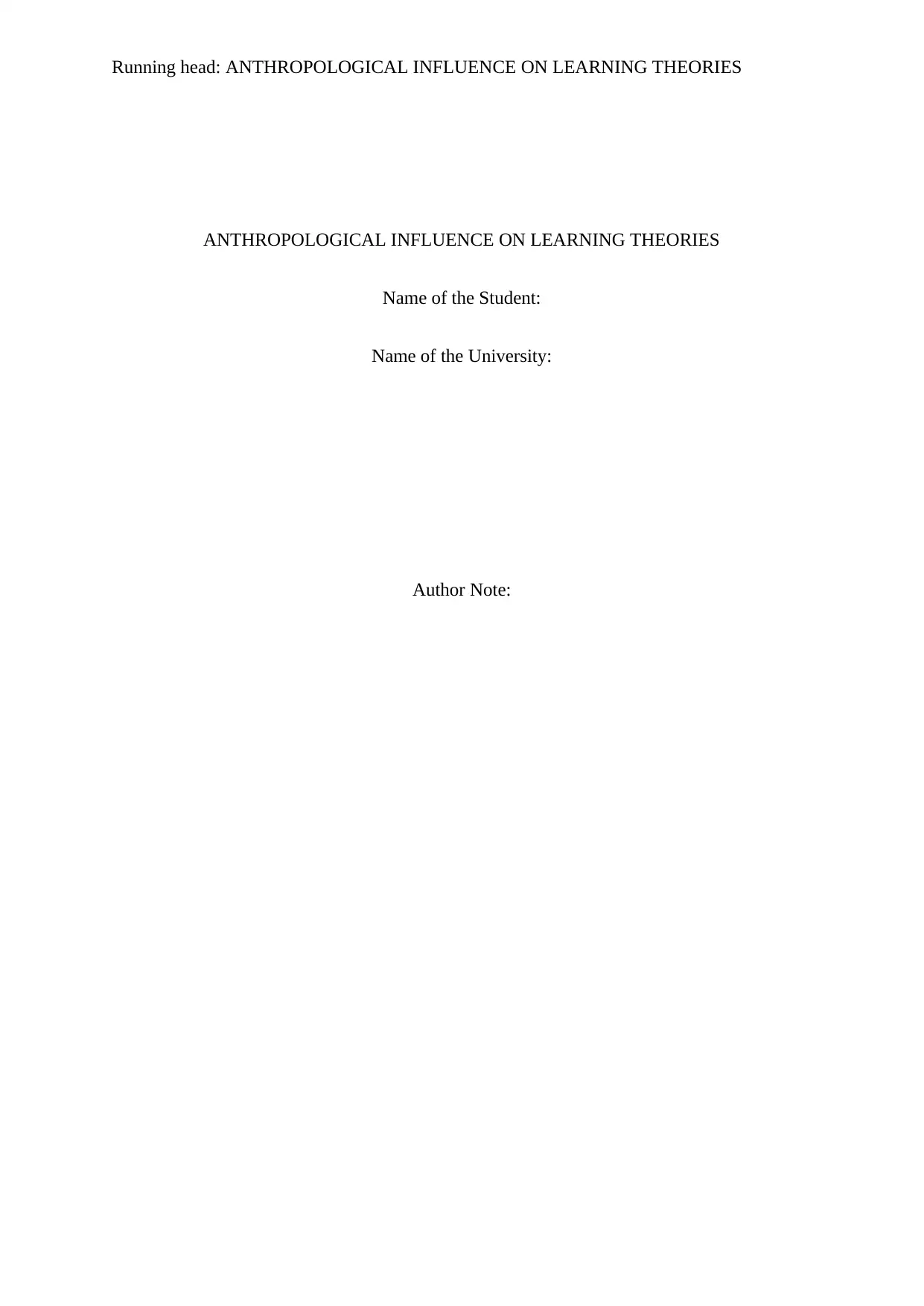
Running head: ANTHROPOLOGICAL INFLUENCE ON LEARNING THEORIES
ANTHROPOLOGICAL INFLUENCE ON LEARNING THEORIES
Name of the Student:
Name of the University:
Author Note:
ANTHROPOLOGICAL INFLUENCE ON LEARNING THEORIES
Name of the Student:
Name of the University:
Author Note:
Paraphrase This Document
Need a fresh take? Get an instant paraphrase of this document with our AI Paraphraser
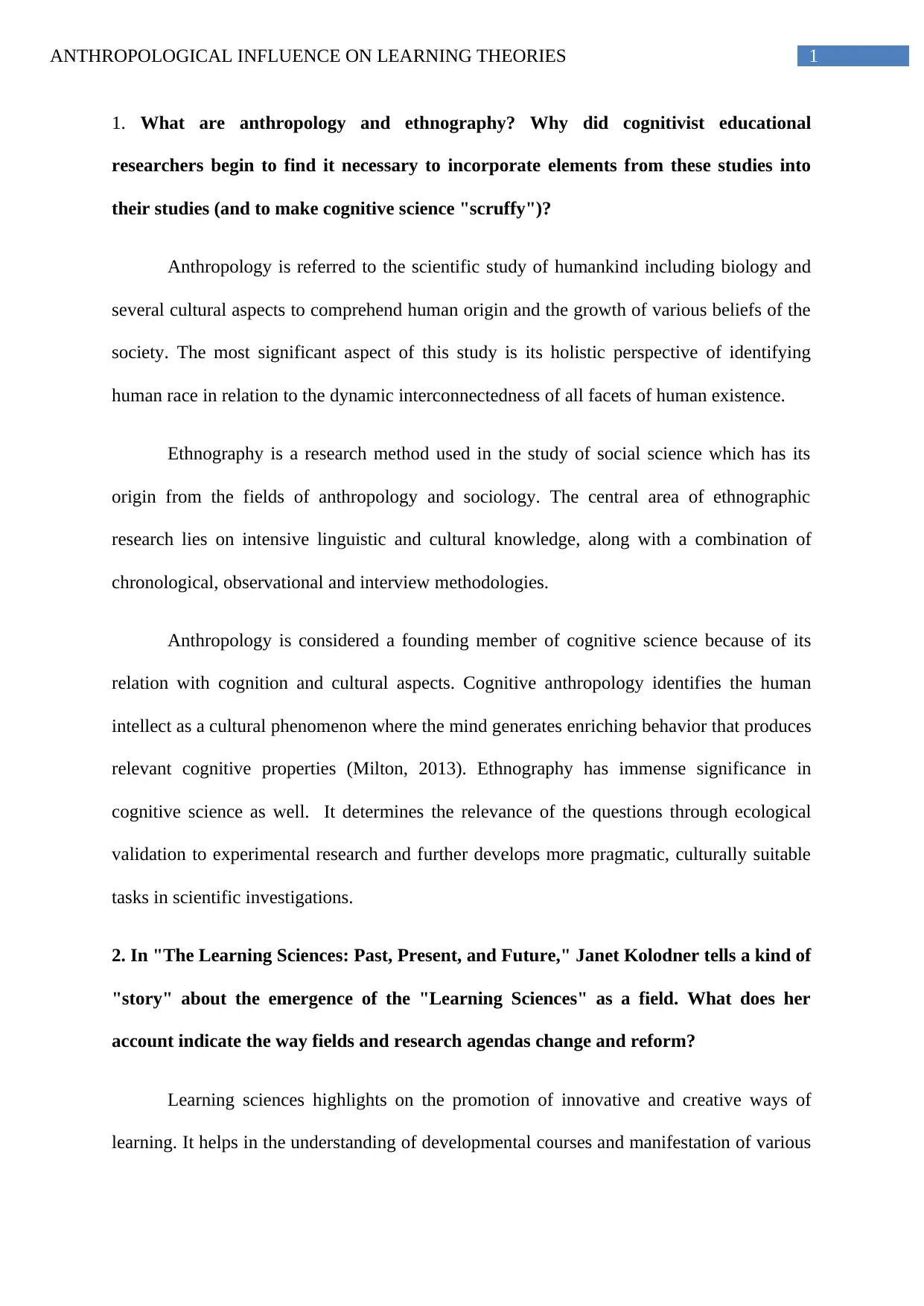
1ANTHROPOLOGICAL INFLUENCE ON LEARNING THEORIES
1. What are anthropology and ethnography? Why did cognitivist educational
researchers begin to find it necessary to incorporate elements from these studies into
their studies (and to make cognitive science "scruffy")?
Anthropology is referred to the scientific study of humankind including biology and
several cultural aspects to comprehend human origin and the growth of various beliefs of the
society. The most significant aspect of this study is its holistic perspective of identifying
human race in relation to the dynamic interconnectedness of all facets of human existence.
Ethnography is a research method used in the study of social science which has its
origin from the fields of anthropology and sociology. The central area of ethnographic
research lies on intensive linguistic and cultural knowledge, along with a combination of
chronological, observational and interview methodologies.
Anthropology is considered a founding member of cognitive science because of its
relation with cognition and cultural aspects. Cognitive anthropology identifies the human
intellect as a cultural phenomenon where the mind generates enriching behavior that produces
relevant cognitive properties (Milton, 2013). Ethnography has immense significance in
cognitive science as well. It determines the relevance of the questions through ecological
validation to experimental research and further develops more pragmatic, culturally suitable
tasks in scientific investigations.
2. In "The Learning Sciences: Past, Present, and Future," Janet Kolodner tells a kind of
"story" about the emergence of the "Learning Sciences" as a field. What does her
account indicate the way fields and research agendas change and reform?
Learning sciences highlights on the promotion of innovative and creative ways of
learning. It helps in the understanding of developmental courses and manifestation of various
1. What are anthropology and ethnography? Why did cognitivist educational
researchers begin to find it necessary to incorporate elements from these studies into
their studies (and to make cognitive science "scruffy")?
Anthropology is referred to the scientific study of humankind including biology and
several cultural aspects to comprehend human origin and the growth of various beliefs of the
society. The most significant aspect of this study is its holistic perspective of identifying
human race in relation to the dynamic interconnectedness of all facets of human existence.
Ethnography is a research method used in the study of social science which has its
origin from the fields of anthropology and sociology. The central area of ethnographic
research lies on intensive linguistic and cultural knowledge, along with a combination of
chronological, observational and interview methodologies.
Anthropology is considered a founding member of cognitive science because of its
relation with cognition and cultural aspects. Cognitive anthropology identifies the human
intellect as a cultural phenomenon where the mind generates enriching behavior that produces
relevant cognitive properties (Milton, 2013). Ethnography has immense significance in
cognitive science as well. It determines the relevance of the questions through ecological
validation to experimental research and further develops more pragmatic, culturally suitable
tasks in scientific investigations.
2. In "The Learning Sciences: Past, Present, and Future," Janet Kolodner tells a kind of
"story" about the emergence of the "Learning Sciences" as a field. What does her
account indicate the way fields and research agendas change and reform?
Learning sciences highlights on the promotion of innovative and creative ways of
learning. It helps in the understanding of developmental courses and manifestation of various
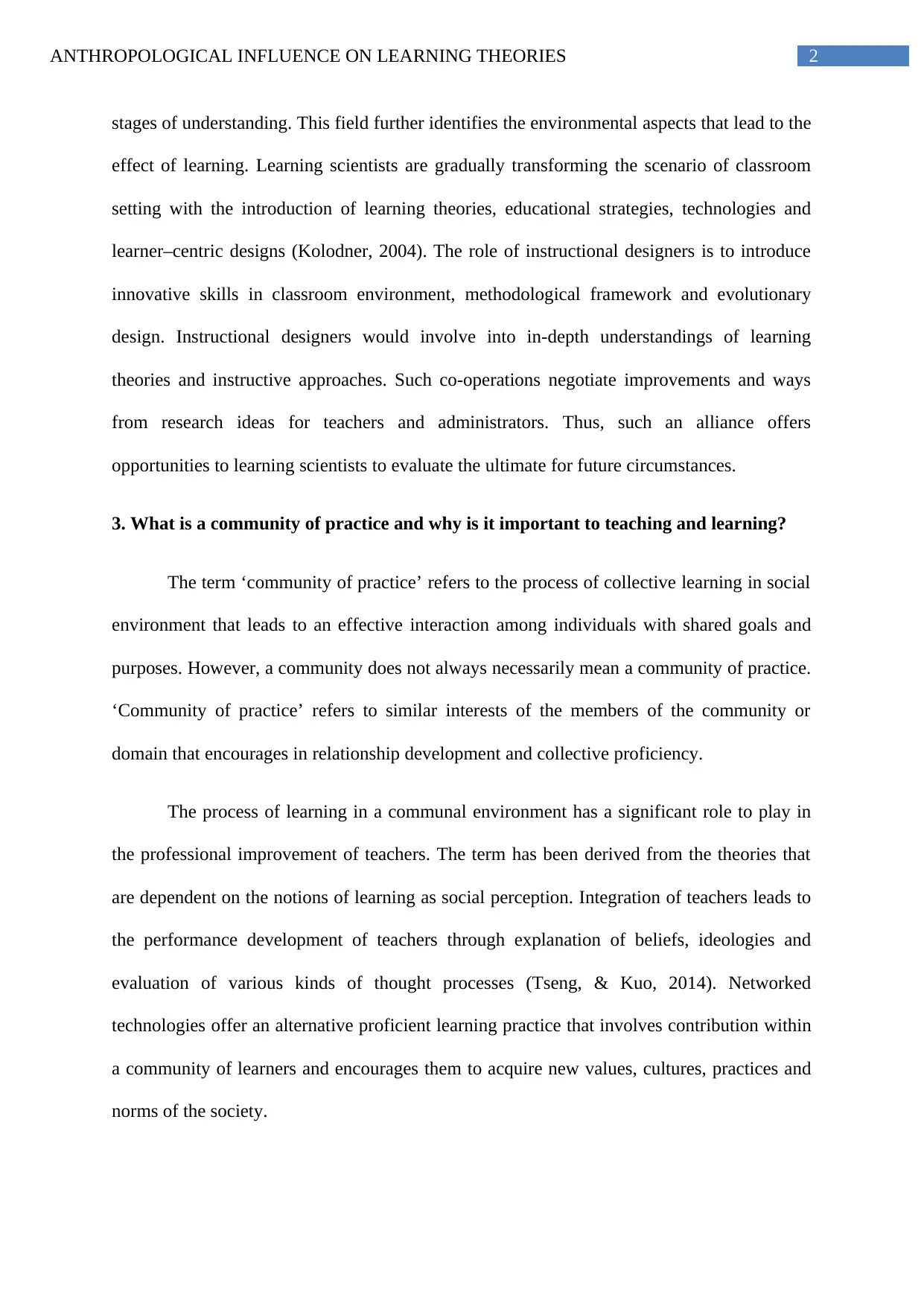
2ANTHROPOLOGICAL INFLUENCE ON LEARNING THEORIES
stages of understanding. This field further identifies the environmental aspects that lead to the
effect of learning. Learning scientists are gradually transforming the scenario of classroom
setting with the introduction of learning theories, educational strategies, technologies and
learner–centric designs (Kolodner, 2004). The role of instructional designers is to introduce
innovative skills in classroom environment, methodological framework and evolutionary
design. Instructional designers would involve into in-depth understandings of learning
theories and instructive approaches. Such co-operations negotiate improvements and ways
from research ideas for teachers and administrators. Thus, such an alliance offers
opportunities to learning scientists to evaluate the ultimate for future circumstances.
3. What is a community of practice and why is it important to teaching and learning?
The term ‘community of practice’ refers to the process of collective learning in social
environment that leads to an effective interaction among individuals with shared goals and
purposes. However, a community does not always necessarily mean a community of practice.
‘Community of practice’ refers to similar interests of the members of the community or
domain that encourages in relationship development and collective proficiency.
The process of learning in a communal environment has a significant role to play in
the professional improvement of teachers. The term has been derived from the theories that
are dependent on the notions of learning as social perception. Integration of teachers leads to
the performance development of teachers through explanation of beliefs, ideologies and
evaluation of various kinds of thought processes (Tseng, & Kuo, 2014). Networked
technologies offer an alternative proficient learning practice that involves contribution within
a community of learners and encourages them to acquire new values, cultures, practices and
norms of the society.
stages of understanding. This field further identifies the environmental aspects that lead to the
effect of learning. Learning scientists are gradually transforming the scenario of classroom
setting with the introduction of learning theories, educational strategies, technologies and
learner–centric designs (Kolodner, 2004). The role of instructional designers is to introduce
innovative skills in classroom environment, methodological framework and evolutionary
design. Instructional designers would involve into in-depth understandings of learning
theories and instructive approaches. Such co-operations negotiate improvements and ways
from research ideas for teachers and administrators. Thus, such an alliance offers
opportunities to learning scientists to evaluate the ultimate for future circumstances.
3. What is a community of practice and why is it important to teaching and learning?
The term ‘community of practice’ refers to the process of collective learning in social
environment that leads to an effective interaction among individuals with shared goals and
purposes. However, a community does not always necessarily mean a community of practice.
‘Community of practice’ refers to similar interests of the members of the community or
domain that encourages in relationship development and collective proficiency.
The process of learning in a communal environment has a significant role to play in
the professional improvement of teachers. The term has been derived from the theories that
are dependent on the notions of learning as social perception. Integration of teachers leads to
the performance development of teachers through explanation of beliefs, ideologies and
evaluation of various kinds of thought processes (Tseng, & Kuo, 2014). Networked
technologies offer an alternative proficient learning practice that involves contribution within
a community of learners and encourages them to acquire new values, cultures, practices and
norms of the society.
⊘ This is a preview!⊘
Do you want full access?
Subscribe today to unlock all pages.

Trusted by 1+ million students worldwide
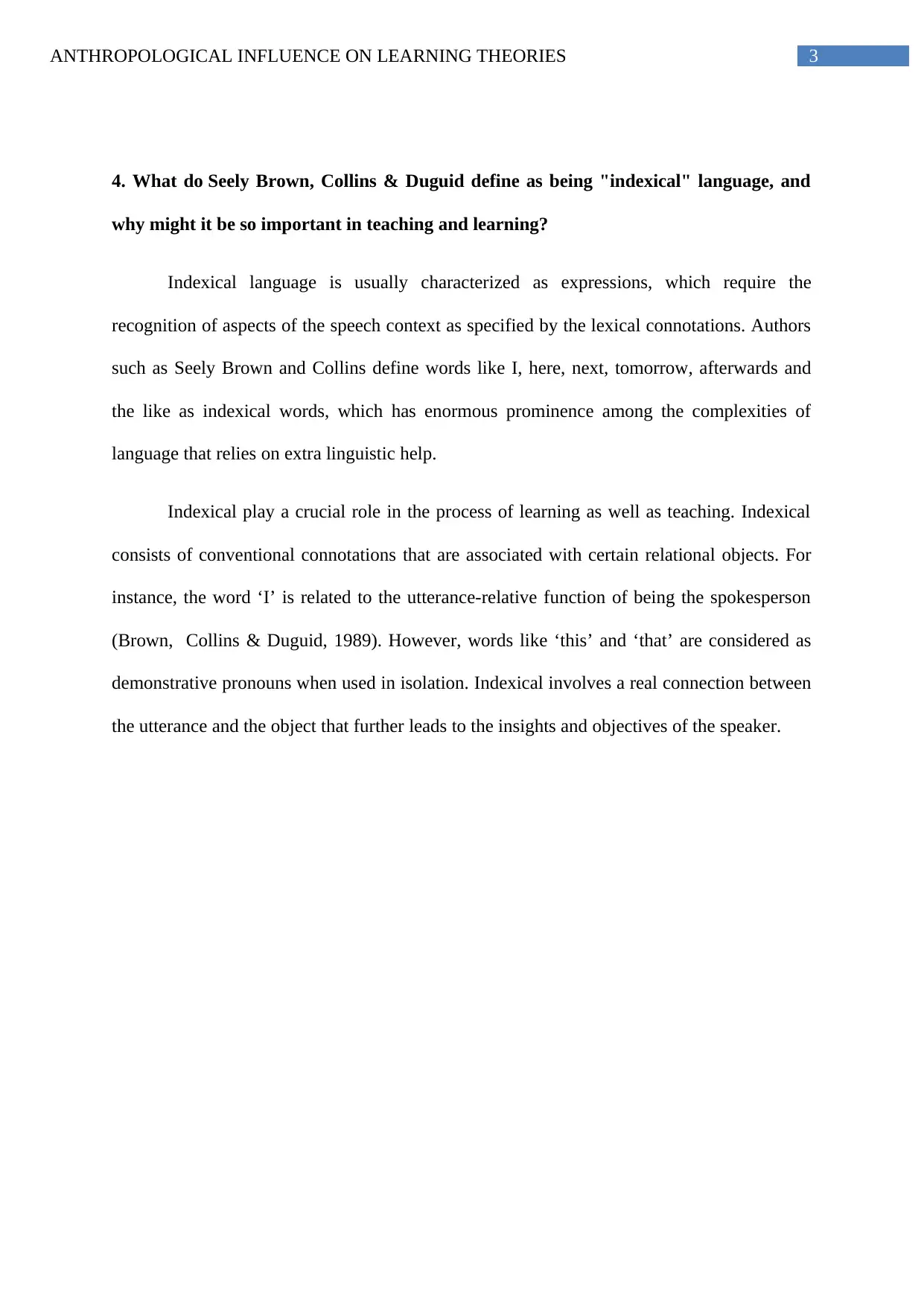
3ANTHROPOLOGICAL INFLUENCE ON LEARNING THEORIES
4. What do Seely Brown, Collins & Duguid define as being "indexical" language, and
why might it be so important in teaching and learning?
Indexical language is usually characterized as expressions, which require the
recognition of aspects of the speech context as specified by the lexical connotations. Authors
such as Seely Brown and Collins define words like I, here, next, tomorrow, afterwards and
the like as indexical words, which has enormous prominence among the complexities of
language that relies on extra linguistic help.
Indexical play a crucial role in the process of learning as well as teaching. Indexical
consists of conventional connotations that are associated with certain relational objects. For
instance, the word ‘I’ is related to the utterance-relative function of being the spokesperson
(Brown, Collins & Duguid, 1989). However, words like ‘this’ and ‘that’ are considered as
demonstrative pronouns when used in isolation. Indexical involves a real connection between
the utterance and the object that further leads to the insights and objectives of the speaker.
4. What do Seely Brown, Collins & Duguid define as being "indexical" language, and
why might it be so important in teaching and learning?
Indexical language is usually characterized as expressions, which require the
recognition of aspects of the speech context as specified by the lexical connotations. Authors
such as Seely Brown and Collins define words like I, here, next, tomorrow, afterwards and
the like as indexical words, which has enormous prominence among the complexities of
language that relies on extra linguistic help.
Indexical play a crucial role in the process of learning as well as teaching. Indexical
consists of conventional connotations that are associated with certain relational objects. For
instance, the word ‘I’ is related to the utterance-relative function of being the spokesperson
(Brown, Collins & Duguid, 1989). However, words like ‘this’ and ‘that’ are considered as
demonstrative pronouns when used in isolation. Indexical involves a real connection between
the utterance and the object that further leads to the insights and objectives of the speaker.
Paraphrase This Document
Need a fresh take? Get an instant paraphrase of this document with our AI Paraphraser
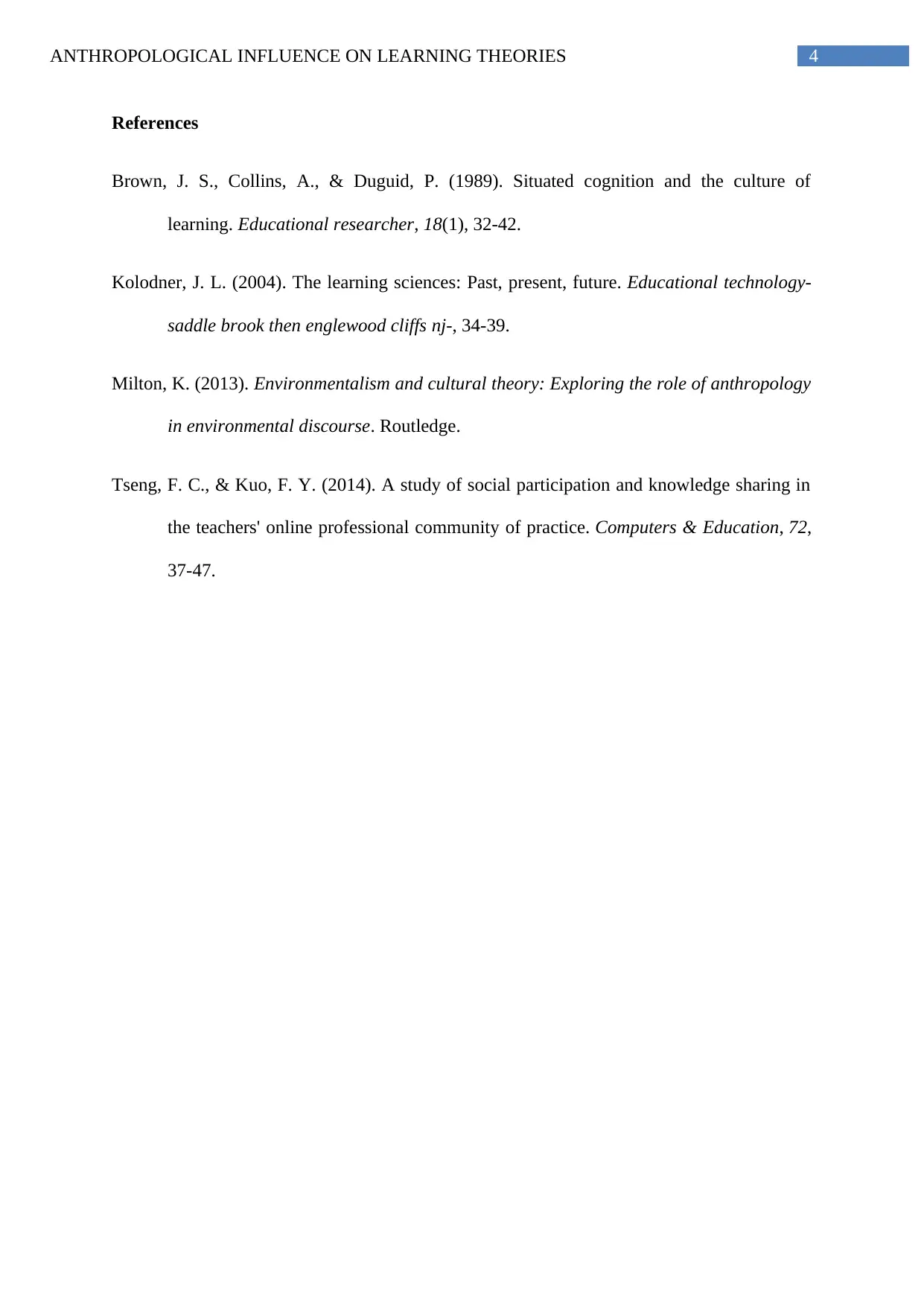
4ANTHROPOLOGICAL INFLUENCE ON LEARNING THEORIES
References
Brown, J. S., Collins, A., & Duguid, P. (1989). Situated cognition and the culture of
learning. Educational researcher, 18(1), 32-42.
Kolodner, J. L. (2004). The learning sciences: Past, present, future. Educational technology-
saddle brook then englewood cliffs nj-, 34-39.
Milton, K. (2013). Environmentalism and cultural theory: Exploring the role of anthropology
in environmental discourse. Routledge.
Tseng, F. C., & Kuo, F. Y. (2014). A study of social participation and knowledge sharing in
the teachers' online professional community of practice. Computers & Education, 72,
37-47.
References
Brown, J. S., Collins, A., & Duguid, P. (1989). Situated cognition and the culture of
learning. Educational researcher, 18(1), 32-42.
Kolodner, J. L. (2004). The learning sciences: Past, present, future. Educational technology-
saddle brook then englewood cliffs nj-, 34-39.
Milton, K. (2013). Environmentalism and cultural theory: Exploring the role of anthropology
in environmental discourse. Routledge.
Tseng, F. C., & Kuo, F. Y. (2014). A study of social participation and knowledge sharing in
the teachers' online professional community of practice. Computers & Education, 72,
37-47.
1 out of 5
Related Documents
Your All-in-One AI-Powered Toolkit for Academic Success.
+13062052269
info@desklib.com
Available 24*7 on WhatsApp / Email
![[object Object]](/_next/static/media/star-bottom.7253800d.svg)
Unlock your academic potential
Copyright © 2020–2026 A2Z Services. All Rights Reserved. Developed and managed by ZUCOL.





